2019 广东中考英语(人教)语法专项: 第Ⅰ章 专题七 介词图片版(共42张PPT)
广东专用2019年中考英语总复习第2部分语法专题复习专题七连词和状语从句课件人教新目标版
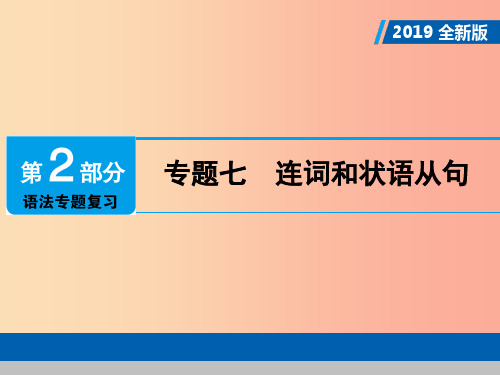
• 高频考点:并列连词 (6年5考;题型:单项填空、 完形填空、短文填空)
• 从属连词 (6年5考;题型:单项填空、完形填空、 短文填空)
• 状语从句 (6年5考;题型:单项填空,主要考查 状语从句中的时态。)
3
CONTEN TS
目 录
考点精讲 易错盘点 解题技巧 试题精练
4
考点精讲
• 考1. 点表并列关并系列连词(6年5考)
/
catch the bus. 快点儿,否则
我们赶不上公共汽车了。
9
• 4. 表因果关系
连词
用法
例句
so (所以)
so与because不 能连用。
She was ill, so she didn't go to school. 她生病了,所以她没
去上学。
for通常是对前
面的情况加以 You'd better take an umbrella,
• C.Both; and D.Not only; but also
12
• ( D )3. (2013广东)Think it over, ______ you'll work out the math problem.
• A.or B.so • C.for D.and • ( A )4. (2012广东)Ben was busy taking a
6
• 2. 表转折关系
连词
用法
例句
but (但是)
(al)though 和 but 不 能 She was very tired, but
连用。 not...but... 意 为 “ 不 是……而是……”。
she kept working till midnight. 她虽然很累, 但是她一直工作到半
人教版广东中考九年级英语专题复习 《语法选择专项学法指导课》 课件(共27张PPT)

A. which
B. whom
√ C. whose D. who
实战演练
句法1: Attributive Clause. 定语从句
(2015广东省中考 44题)
Running man is a very relaxing TV program ______ is hot among
the young people.
or WeChat Pay.
√A. how; whether
C. what; whether
B. how; why D. what; why
实战演练
句法3: Object Clause. 宾语从句
(2017广东省中考 43题) —Do you know _____________ yesterday? —Yes. He went for the boat race. A. why didn't Peter go to school B. why doesn't Peter go to school
引导词+主语+谓语 主现从实 主过从过 客观真理
实战演练
句法3: Object Clause. 宾语从句
(2019广东省中考 43题)
—Have you decided _________ the Expo 2019 Beijing?
—This summer holiday.
A. how are you going to
was
Zhu
_ss_to_il_l_hsaadda__td_hr_ae_t_am结sh果etorehfauvseeda
her parents’ advice. brighter future_t_h_o__u_g_h__
英语中考语法 介词 课件 (共103张PPT)

for for+一段时间,达……之久(表示经过了多少时间),可以和 一般现在时、过去时、将来时连用,但经常和完成时连用。
from
用于一般过去、一般现在或一般将来时
since
自从……以来(表示从以前某时一直到现在仍在继续)
since+时间点,主要用于完成时或完成进行时
① We go to school from Monday to Friday. (from…to…“从…到…”,不能用于完成时) ② I have been sick since yesterday.我从昨天起就病了。(强调一直病到现在) ③ The doctor has saved a lot of lives since he became a doctor.
A. during B. after C. for D. in
a few
( D )My brother joined the army last year. A. on B. by C. at D. in
September
( A )— How soon will we get the offer from a new high school? — ________about two months.
after+时间点,用于将来时,表“在……以后”
① I went to the cinema befroe 7 p.m. yesterday. ② After two days, the police finally found the lost girl.
两天之后,警方终于找到那个走失的女孩。 ③We are leaving for Shanghai after two o'clock.
介词(19张PPT)初中英语专项复习课件

(五)at 与in at与较小的地点连用,in与较大的地点连用。如: He arrived at school at 8 o'clock. 他八点到达学校。 He arrived in Paris yesterday. 他昨天到达巴黎。
(三)be+形容词+介词 be born in…出生于…… be good at…擅长…… be made of…由……制成 be angry with sb.跟某人生气 be angry at sth.为某事生气 be pleased with sb.对某人感到满意 be satisfied with sth.对某事感到满意 be surprised at… 对……感到惊奇(诧异)
They walked through the forest. 他们穿过森林。
(四)in front of与in the front of in front of 表示“在某人或某物的前面”,在某个范围以外; in the front of 表示“在……的前部”,在某个范围以内。如: There are some tall trees in front of the building. 这座楼前面有一些高高的树木。
(二)介词+名词 in time 及时 on time 准时 at home 在家 in English 用英语 at night 在晚上 with a smile 带着微笑 without breakfast 没吃早餐 at first 首先 at last 最后
on one's way to… 在某人去……的路上 at once 立刻,马上 at the same time 同时 by hand 手工,亲手 in trouble 处于困境 in fact 事实上 on duty 值日 on the left/right 在左/右边 to one's surprise 令某人吃惊的是
介词(37张PPT)初中英语专项复习课件

常+时间点
before
He must be back home before 10
介词
till/until
用法
表示“到……为止;直至”。
举例
He didn’t leave the office until 12 o’clock. (非延续性动词) Let’s stay here till tomorrow. (延续性动词)
she decided to do. 她知道, 无论她决定做什么,她的家人肯定会支持她。
妙辨异同:in front of/in the front of/in front
in front of:表示“在……前面”, 为介词短语, 指在某人/物体前 面。
in the front of:表示“在……前部”,为介词短语,指在某一物体 内部的前面。
above 表示“在……上方; 在……之上”,不一定在正上方,反义词为
below; over 表示“在……的上方”,强调位于物体正上方,反义词为under(两个 物体间有接触或无接触); on 表示“在……上”,强调两个物体间有接触; against 表示“倚; 靠; 撞”。
A plane is flying above us. I could hear the noise in the yard below my window. There are many books on the shelf. There is a bridge over the river. There is a ball under the teacher’s desk. Bob sat down against a tree.
in front:表示“在前面”,为副词短语。walk in front 走在前面
(广东地区)2019年中考英语复习专题一名词(讲解部分)素材(pdf)

部分以⁃f, 的名词
把⁃f
thiefңthieves
⁃fe 结 尾
或⁃fe
knifeңknives leafңleaves lifeңlives wifeңwives
改 为 ⁃v, 再 加⁃es
shelfңshelves
表 人
示
某国
an Americanңtwo Americans an Englishmanңtwo Englishmen a Frenchmanңtwo Frenchmen a mouseңtwo mice a childңtwo children㊀ an oxңtwo oxen
条件
变化
例词
注意
以 ch 结尾的名词, 多数加⁃es 以⁃s, 在 词 尾 加⁃es glassңglasses busңbuses boxңboxes 变复数,但当 ch 读 [ k] 时, 其 复数应加 ⁃s ,例如: stomachңstomachs㊂ 注意: 名 词以 th 结尾时,变复数时, 是 mouth ң mouths, month ң months,bathңbaths 有些以⁃f 结尾的单词变为复 数时,只能加⁃s,例如: roofңroofs beliefңbeliefs proofңproofs
但是, handkerchief 在 变 为 复 数时,可有两种变换形式, 即 handkerchiefs / handkerchieves
loafңloaves
(复合
以辅音字 母加⁃y 结 尾的名词
⁃x,⁃ch, 的名词
指 鱼的多少 时, 是可数名词, 但单数和复数同形㊂
⁃sh 结 尾
watchңwatches brushңbrushes selfңselves
2019中考广东人教英语复习必备课件:教材梳理-9U1-2(共29张PPT)

不迟于……”;(4)用于被动语态中,意为“被……”; (5)用于固定搭配中,如:by the way(顺便问一下), by oneself(独自地)。 考点2 I don’t know how to increase my reading speed. 我不 知道怎么提高我的阅读速度。 【解析】“特殊疑问词+动词不定式”构成的短语用在 know,tell,wonder,ask,learn,find out等动词或动 词短语之后作宾语(可以改写成相应的宾语从句),也可直 接作句子的主语。常见的这种特殊疑问词有what,which, when,where,how 等。
to意为“习惯于”;prefer doing sth. to doing sth. 意为 “比起做某事更喜欢做某事”。 考点4 He warns Scrooge to change his ways if he doesn’t want to end up like him. 他警告斯克鲁奇,如果他不想最 终成为像他一样的人,就得改变他的生活方式。 【解析】warn sb.(not)to do sth. 意为“警告/告诫某人(不 要)做某事”;warn sb. about sth. 意为“警告某人某事”; warn sb. that ... 意为“警告某人……”。
教材梳理(RJ)
九年级 Unit1~Unit2
基础过关
高频词汇
1. 句子 ___s_e_n_te_n_c_e_ 2. 有耐心的 __p_a_t_ie_n_t___
3. 发现 __d_i_s_c_o_v_e_r _
4. 语法 __g_r_a_m__m_a_r_
5. 重复 ___re_p_e_a_t__
13. 复习 ___re_v_i_e_w___ 14. 知识 _k_n_o_w_l_e_d_g_e_
广东省中考英语总复习 第一部分 常用单词 词组用法辨析 第一节4课件

附:be used by意为“被……使用”,介词by后面 接动作的执行者;be used as意为“被用作……”,介 词as表示“作为”,其后通常接名词。
【举例】 I feel like (having)a drink.=I would like (to
have)a drink.=I want (to have)a drink. 我想喝一杯。 Do you feel like taking a walk?=Would you like
to take a walk?=Do you want to take a walk? 你要不 要散步?
This piece of cloth is used as a curtain. 这块 布被用作窗帘。
【演练】
( B )1. He _____ used to working in the country.
A. /
B. got
C. be
D. get
( D )2. Was he used to _______ in the castle?
A. want to
B. like to
C. felt like
D. feel like
( B )4. —_______ you like something to eat? —Yes, please.
A. Do
B. Would
C. Are
D. Could
★32. win, beat 【辨析】
win意为“赢得比赛;获胜”,其宾语是表示比赛 (game, match, contest, competition, war)、 奖品(prize,medal)等内容的名词,不能是人。beat 更侧重“打败;胜过”之意,其后所接的宾语多是某 运动员或球队之类。此外,beat还可以表示“敲打; (心脏等)跳动”。
广东2019年中考英语解读总复习课件:第一部分 第5节 介词和介词短语(共25张PPT)
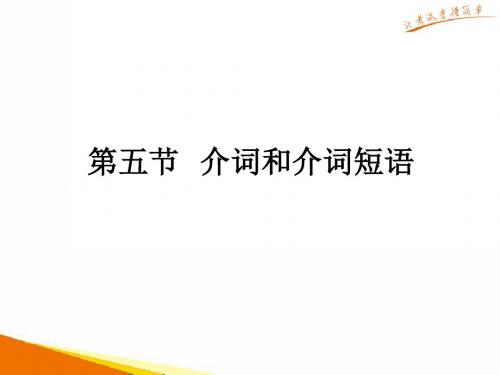
真题试练
( A )1. — How soon will we get the offer from a new high school? — ________ about two months.(2018· 广东省)
A.In
B.For
C.Among
D.During
( A )2. It’s very kind ________ you to lend me your reusable shopping bags.(2017· 广东省) A.of B.for C.to D.with
in
(3)
after
表示“过 了……” (在 ①It’s ___________ ten past ten (10点10分). 0~30分钟内) ②The meeting will begin at 表示“还 (9点50分). ten to ten 差……”(大 _____________ 于30分钟) in 多用于将来 ①My sister will be back ______ 时,后面接 a week. 时间段 ②My sister came back _______ after 多用于一般 a week. 过去时,后 面可接时间 段或具体时 间
since
2. 表示地点的介词
序号 介词 at 用法 接小地方 分类
①My brother works _____ at/in the factory.
in Beijing ②He arrived ______ yesterday.
in
(1)
接大地方; in the east of 在某范围内 ③Shanghai lies ______ China.
2019广州市中考英语真题附答案
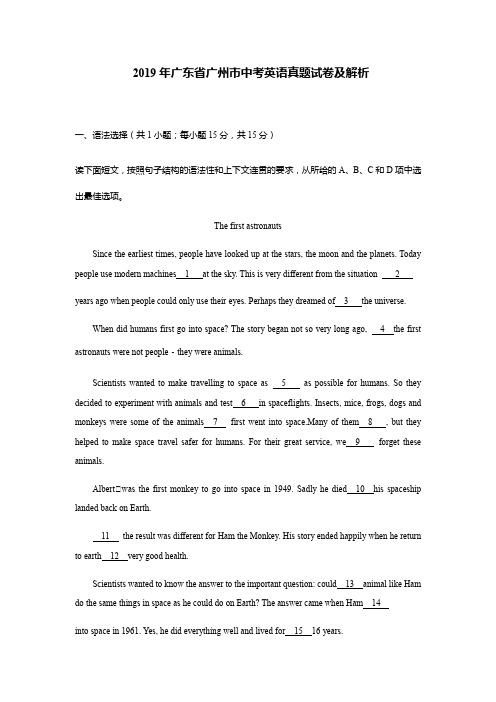
2019年广东省广州市中考英语真题试卷及解析一、语法选择(共1小题;每小题15分,共15分)读下面短文,按照句子结构的语法性和上下文连贯的要求,从所给的A、B、C和D项中选出最佳选项。
The first astronautsSince the earliest times, people have looked up at the stars, the moon and the planets. Today people use modern machines 1 at the sky. This is very different from the situation 2 years ago when people could only use their eyes. Perhaps they dreamed of 3 the universe.When did humans first go into space? The story began not so very long ago, 4 the first astronauts were not people﹣they were animals.Scientists wanted to make travelling to space as 5 as possible for humans. So they decided to experiment with animals and test 6 in spaceflights. Insects, mice, frogs, dogs and monkeys were some of the animals 7 first went into space.Many of them 8 , but they helped to make space travel safer for humans. For their great service, we 9 forget these animals.AlbertⅡwas the first monkey to go into space in 1949. Sadly he died 10 his spaceship landed back on Earth.11 the result was different for Ham the Monkey. His story ended happily when he return to earth 12 very good health.Scientists wanted to know the answer to the important question: could 13 animal like Ham do the same things in space as he could do on Earth? The answer came when Ham 14into space in 1961. Yes, he did everything well and lived for 15 16 years.( )1. A. look B. to look C. looking D. looked( )2. A. thousand B. thousands C. thousand of D. thousands of( )3. A. explore B. to explore C. explored D. exploring( )4. A. as B. or C. but D. so( )5. A. safe B. safer C. safest D. the safest( )6. A. they B. them C. their D. theirs( )7. A. whom B. what C. that D. whose( )8. A. die B. died C. have died D. will die( )9. A. shouldn't B. may not C. don't have to D. needn't( )10. A. if B. because C. after D. since( )11. A. Luck B. Luck C. Luck D. Luckily( )12. A. at B. on C. in D. for( )13. A. a B. an C. the D. /( )14. A. send B. sent C. is sent D. was sent( )15. A. another B. other C. others D. the others二、完形填空(共15小题;每小题1分,共15分)阅读下面短文,掌握其大意,然后从各题所给的A、B、C和D项中选出最佳选项。
广东省广州市2019年中考英语试题(含答案解析)
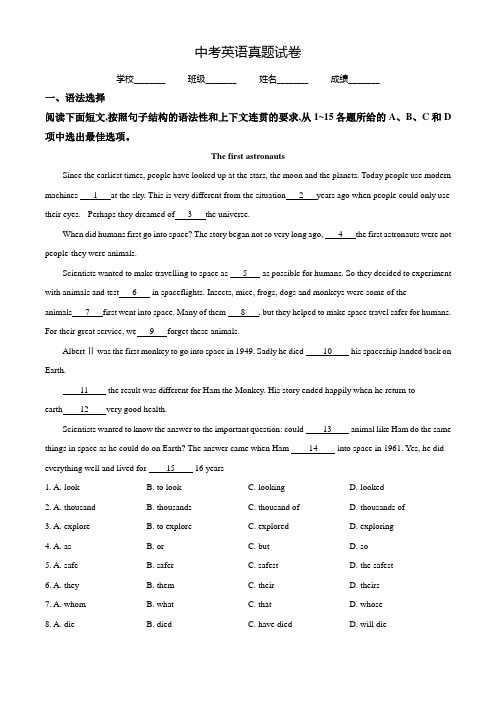
中考英语真题试卷学校________ 班级________ 姓名________ 成绩________一、语法选择阅读下面短文,按照句子结构的语法性和上下文连贯的要求,从1~15各题所给的A、B、C和D 项中选出最佳选项。
The first astronautsSince the earliest times, people have looked up at the stars, the moon and the planets. Today people use modern machines ___1___at the sky. This is very different from the situation___2___years ago when people could only use their eyes. Perhaps they dreamed of___3___the universe.When did humans first go into space? The story began not so very long ago, ___4___the first astronauts were not people-they were animals.Scientists wanted to make travelling to space as ___5___ as possible for humans. So they decided to experiment with animals and test___6___ in spaceflights. Insects, mice, frogs, dogs and monkeys were some of theanimals___7___first went into space. Many of them ___8___, but they helped to make space travel safer for humans. For their great service, we___9___forget these animals.Albert Ⅱ was the first monkey to go into space in 1949. Sadly he died ____10____ his spaceship landed back on Earth.____11____ the result was different for Ham the Monkey. His story ended happily when he return toearth____12____very good health.Scientists wanted to know the answer to the important question: could ____13____ animal like Ham do the same things in space as he could do on Earth? The answer came when Ham ____14____ into space in 1961. Yes, he did everything well and lived for ____15____ 16 years1. A. look B. to look C. looking D. looked2. A. thousand B. thousands C. thousand of D. thousands of3. A. explore B. to explore C. explored D. exploring4. A. as B. or C. but D. so5. A. safe B. safer C. safest D. the safest6. A. they B. them C. their D. theirs7. A. whom B. what C. that D. whose8. A. die B. died C. have died D. will die9. A. shouldn’t B. may not C. don’t have to D. needn’t10. A. if B. because C. after D. since11. A. Luck B. Lucky C. Luckier D. Luckily12. A. at B. on C. in D. for13. A. a B. an C. the D. /14. A. send B. sent C. is sent D. was sent15. A. another B. other C. others D. the others二、完形填空John suddenly jumped off the swing without even slowing down. He called out nervously, “Mom, where's Charlie? "He had just ___16___he hadn't seen his new puppy for over an hour.John looked around the garden, behind the bushes, and under the picnic table. No dog! His mother heard___17___in his voice as he called her a second time. " Mom, I can't find Charlie!"She came outside ___18___. "Let's look around the garden first. Don’t worry. I'm sure he's clos e by.Both son and mother were ___19___now, but still no Charlie. Their calls were not completely wasted, though. Joe, the next-door neighbor, and his two daughters Tania and Julie, immediately agreed to help them ___20___the lost dog.But even with five people now searching the town's streets, they had no luck. Charlie was still___21___Tania suggested they make posters with Charlie’s ___22___She had done this when her own cat was lost a year earlier, she told John, and the cat was found the next day.John agreed. When they got home, he made a poster with a photo of Charlie, Then John heard a___23___ and opened his bedroom door. It was Charlie. John was greeted with a big wet kiss Charlie had been___24___ in the bedroom this whole time, sleeping. John had never been so ___25___in his life!16. A. decided B. forgotten C. understood D. realized17. A. anger B. hope C. fear D. warning18. A. actively B. quickly C. carelessly D. annoyingly19. A. shouting B. talking C. fighting D. thinking20. A. give up B. look for C. run after D. take care of21. A. missing B. asleep C. take D. quiet22. A. address B. character C. name D. picture23. A. mess B. noise C. voice D. song24. A. shut B. woke C. tied D. saved25. A. afraid B. silly C. happy D. proud三、阅读第一节阅读理解AAn elephant and a crocodile were once standing beside river. They were disputing which was the better animal.“Look at my strength,” said the elephant. “I can pull up a tree, roots and all with my trunk”“Ah! But your skin is not nearly so thick as mine,” replied the crocodile. “No knife or tooth can cut through it.”Just as they were coming to blows, a lion happened to pass.“My dear friends !” said the King of all animals, going up to them. “Let me know the cause of your disagreement.”“Will you kindly tell us which is the better animal?” cried both at once.“Certainly”,said the lion, pointing across the river. “Do you see the soldiers’ metal hat on that wall?”“Yes!” replied the beasts.“Well, then,” continued the lion, “ go and get it, and bring it to me, and I shall be able then to decide between you.”Upon hearing this, off they started. The crocodile, being used to the water, reached the opposite side of the river first, and was soon standing beside the wall.Here he waited till the elephant came up. The elephant, seeing that the crocodile had no way of reaching their goal, raised his long trunk, and took down the hat quite easily.They then made their way together back again across the river. The elephant was trying to keep up with the fast-moving crocodile in the water and became careless. When he was forced to turn sharply to avoid a floating tree branch, the elephant dropped the hat and it fell to the river bottom. The crocodile noticed the accident, so down he dived, and brought it up in his huge mouth. They then returned, and the crocodile laid the metal hat at the lion's feet. The King took it up, and turning to the elephant, said:“You, because of your size and trunk, were able to reach the hat on the wall but, having lost it, yo u were unable to get it back. And you,” said the lion to the crocodile, “although unable to reach the hat, were able to dive for it and save it. You are both wise and able in your own ways. One is no better than the other.”26. The underlined word "disputing" in Paragraph 1 means____.A. playingB. quarrellingC. complainingD. deciding27. What did the crocodile think was the best about himself?A. His big mouthB. His strong skinC. His swimming skillD. His dangerous teeth28. How did the lion deal with the animals’ disagreement?A. He ordered them to fight.B. He made a quick decision.C. He suggested a competitionD. He asked them to describe themselves29. What caused the elephant to drop the hat?A. The hat got wet in the river.B. He hit a floating treeC. He was trying to swim too fastD. He wanted to fight the crocodile30. How were the elephant and the crocodile able to complete their task?A. By working togetherB. planning carefullyC. By sharing their ideasD. By listening to the lionBThey sa y that “travel is the best teacher” and there is no better example of this idea than the Ming dynasty travel writer and geographer Xu Xiake (1587-1641). His book The Travel Notes of Xu Xiake, not only encouraged a love of travelling among Chinese people but provided important scientific information about the country's land and geography.Born into a wealthy Jiangyin family, Xu became interested in books about different places at an early age and wanted to travel. When he was 18, however, Xu's father died and so, it seemed impossible for his travelling dreams. He now was responsible for the family farm and taking care of his 60-year-old mother as tradition required.But his mother had different ideas. Understanding her son’s love of travel and valuing the kno wledge he couldget from such experiences, this modern-thinking woman refused to keep her son at home. She agreed that Xu could travel for three months every year, when there was less farm work.So at the age of twenty and with his mother's support, Xu set off for the first time, leaving behind not only his mother but his new wife as well. He would repeat this goodbye each year for most of the next 30 years. During this time, he travelled throughout the Ming kingdom, carefully studying the lands he passed through and recording his experiences and many discoveries in a diary. This diary, which once had over 500,000 words, would eventually become The Travel Notes of Xu Xiake.Although rich, Xu avoided comfortable travel, preferring to go almost everywhere on foot. This way he could research the environment in detail and get a true picture of the natural world. Many of his trips were to hard-to-reach mountain areas, and through wild forests where few people lived. His willingness to face hardships came at a cost, however. Progress was slow and tiring and he was frequently sick, robbed and beaten during his journeys Sadly Xu became seriously ill during his last and longest journey, a 4-year trip through the Southwest of China. He died in 1641, soon after returning to his hometown for the last time. When his diary was finally printed years after his death, much of it had been destroyed or lost. Although incomplete, it still made Xu a travelling legend around the world.31. What is the passage mainly about______.A.The general details of Xu Xiake's life storyB. The difficulties Xu Xiake faced in his travelsC. The important discoveries made by Xu XiakeD. The influence of Xu's book The Travel Notes of Xu Xiake 32.Which of the following best describes Xu's mother? A. Strict but interesting B. Kind but uneducated C. Helpful and hardworking D. Supportive and open-minded 33. Why did Xu prefer walking during his travels? A. It gave him the chance to meet different kinds of people. B. It helped him to save money and travel for a longer time. C. It allowed him to see and study the environment in detail. D. It was the only way to reach the places he was interested in.34. What is true about Xu's book The Travel Notes of Xu Xiake?A. It was only made public after Xu died.B. It made Xu very famous during his lifetime.C.It was the first travel book ever written in China.D. It was mainly about the different people of China. 35. What is the correct order for the following events from Xu's life? a. He went on his first journey. b. His book was finally printed. c. He returned to his hometown for the last time. d. He developed an interest in books about other places. e. He started managing the family farm after his father died. A. a-e-d-c-b B. d-e-a-c-b C. d-e-a-b-c D. e-d-a-b-c C36. How many readers support the idea of free museums?A. 2.B. 3C. 4D. 537. Who suggests museums should regularly hold special events to collect money?A. Krista Chen.B. Fred SmithC. Rob SanchezD. Li Mishao38. Why does Fred Smith believe that free tickets should be given to high-achieving students?A. Students will then study harder.B. Museums will attract more visitorsC. Museums can make themselves more famousD. These students can better appreciate museums39. Which of the following does Amber White agree with?A. Businesses should offer museums more helpB. People should only pay what they can affordC. Free entry doesn't encourage visitors to museumsD. Everybody should have a chance to visit museums40. What can we know about the website?A. It's quite a new websiteB. It was started in AustraliaC. It's generally for young readersD. It mainly discusses scientific topicsDWhile the start of a new school year is always exciting, this year was even more so for some students at White Cloud Primary School. They became the world's first kids to be taught by an electronic teacher. This electronic teacher is not a human-like robot walking around the classroom Instead, he is a computer-created head that appears, when needed, on students computer or phone screens. His name is Bill.Created by technology company Smart Machines, Bill is able to show human-like behavior. He is designed to teach a special program about environmental-friendly power created by the sun and wind. This program, started in 2005, used to be taught by human teachers.Just like human teachers, Bill is able to immediately respond to the students' questions and opinions about the topic. Thanks to computer cameras, he is also able to see and react to students physical actions. For example, if a student smiles at Bill, he responds by smiling back. This two-way exchange helps get the students' attention. More importantly, it allows the program developers to improve Bills behavior and knowledge base when needed.The program has been a great success, according to Smart Machines spokesman Robert Frost Frost says, “What is interesting to me is the children's reaction to Bill. He really captures their attention.” Frost thinks kids don't find theexperience of being taught by smart machines as strange as older people because they have grown up in a time ofcomputers and smart phones.It is doubtful, however, that human educators will lose their jobs to Bill any time soon. For one,his talking head'sknowledge base is not large. More importantly, even the smartest computer programs can't guess and react to all theunexpected situations that educators face daily. Bill’s future might be as a “personal tutor”, providing kids withone-on-one help for different subjects and topics.41. What is Bill?A.A human-like robotB. A kind of computer gameC. A computer recording toolD. A computer-created talking head 42. How does the two-way exchange help the program developers? A. It lets them correct students' mistakes B. It allows Bill to respond more quickly C. It helps them know how to improve Bill D. It helps them study students' body language 43. The underlined word “they” in Paragraph 4 refers to A. kids B. older people C. smart machines D. program developers 44. What is Bill NOT good at doing? A. Attracting students' attention B. Understanding body language C. Responding to students' questions D. Dealing with unexpected situations45. How might Bill be used in the future according to the last paragraph?A. To work as human classroom teachersB. To encourage students' interest in computersC. To give students personal help with different subjectsD. To watch over the behavior of the students in the classroom第二节阅读填空阅读短文及文后A~E选项,选出可以填入46~50各题空白处的最佳选项。
2019 广东中考英语(人教)语法专项:第Ⅰ章 专题四 代 词图片版(共79张PPT)

3. 重难点解析:it 的用法 用 法 例 子 He bought a present for me and I liked it very much. 他给我买了一份礼 物, 我非常喜欢它。 It often rains heavily in my hometown in summer. 在夏天,我的家乡经常下 很大的雨。
用法
中考专题面对面
( B )1. (2018 广东) Boxing Day, the 26th of December, got _______ name from a time when many rich families gave boxes of gifts to poor people who had to work at Christmas. A. it’s B. its C. one’s D. one
考点①人称代词
1. 人称代词的分类
人称 第一人称 第二人称 第三人称 单数 主格 宾格 I me you you he him she her it it 复数 主格 宾格 we us you you they them
2. 人称代词的用法 成分 例子 She is taller than him. 她比他高。 动词前用主 You, Tom and I like 主语 格 English. 你、汤姆还有 我都喜欢英语。 Please give her an 动词或介词 apple. 请给她一个苹 宾语 后用宾格 果。 用法
( D )2. —Do you love the poems written by Li Qingzhao? —Yes, a little. But I prefer those written by Du Fu because his poems are great and ______ can cheer me up. A. it B. he C. she D. they ( B )3. —What happened? The atmosphere is a bit strange. —Tom’s mother is angry with ________ because _______ fought with Bob this morning. A. his; him B. him; he C. he; him D. him; his
广东专用2019年中考英语总复习第2部分语法专题复习专题七连词和状语从句课件人教新目标版201901
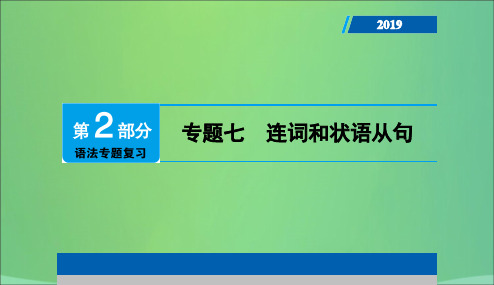
专题七 连词和状语从句2019•分析广东近6年的中考真题可知,连词和状语从句是每年的必考点(2~4.5分)。
单项填空主要涉及并列连词(2018年,2015年,2013年)、结合状语从句来考查从属连词(2017年,2016年,2014年)以及状语从句中的时态(2017年,2016年,2015年,2014年,2013年);完形填空主要涉及并列连词(6年3考)和从属连词(6年2考);短文填空主要涉及并列连词(6年2考)和从属连词(6年3考)。
其命题规律为:•高频考点:并列连词 (6年5考;题型:单项填空、完形填空、短文填空)•从属连词 (6年5考;题型:单项填空、完形填空、短文填空)•状语从句 (6年5考;题型:单项填空,主要考查状语从句中的时态。
)目 录CONTENTS考点精讲易错盘点解题技巧试题精练•1. 表并列关系考点精讲考点 并列连词(6年5考)连词用法例句and (和,并且)/He likes drawing and I likedancing. 他喜欢画画,我喜欢跳舞。
or (和)表并列时用于否定句中。
I don't like milk or juice. 我不喜欢牛奶和果汁。
连词用法例句both...and... (两者都……)连接两个主语时谓语动词用复数。
Both Mary and I are good atmath. 玛丽和我都擅长数学。
not only...but also... (不仅……而且……)连接两个主语时,谓语动词形式遵循就近原则。
Not only you but also hewants to buy the book. 不仅你还有他也想买这本书。
neither...nor... (既不……也不……)Neither you nor I am wrong. 你和我都没错。
as well as(也,而且)连接主语时谓语动词形式由第一个主语确定。
Tom as well as I walks toschool every day.汤姆和我每天步行去上学。
广东专用2019年中考英语总复习第2部分语法专题复习专题七连词和状语从句课件人教新目标版201901
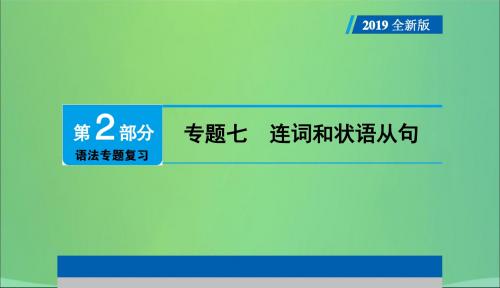
• ( D )3. (2013广东)Think it over, ______ you'll work out the math problem. • A.or B.so • C.for D.and • ( A )4. (2012广东)Ben was busy taking a training class, ______we had to wait for him for half an hour. • A.so B.if • C.or D.but
连接两个主 either...or... 语时,谓语 (或者…… 动词形式遵 或者……) 循就近原则 。 otherwise (否则) /
Hurry up, otherwise we can't catch the bus. 快点儿 ,否则我们赶不上公共汽
• 4. 表因果关系
连词 so (所以)
用法 so与because不 能连用。
(al)though 和 but 不 能 连用。 but not...but... 意 为 “ 不 (但是) 是 …… 而 是……”。 howeve r (然而)
/
连词
用法 yet 可以与
例句 He has a good job, and yet he never seems to have any money. 他有份好工作,然
yet (然而,
可是)
(al)though
连用。
而他却好像总也没有钱。 He's a worker, while his wife
is a doctor. 他是一名工人,
while (而)
/
而他的妻子是一位医生。
• 3. 表选择关系
连词 or (或者, 还是)
2019 广东中考英语(人教)语法专项: 第Ⅰ章 专题八 动词及动词词组图片版(共100张PPT)

be
助动词
用法 例子 “have/has He has been to Hong +过去分 Kong twice. 词”构成现 他到过香港两次。 在完成时 have He had already has “ had +过 finished his had 去分词”构 homewor k when his 成过去完成 father came back. 当他爸爸回来的时候, 时 他已经完成作业了。
( D )2. —________ you go shopping with me this afternoon? —Yes. I want to buy a beautiful dress for my mother. A. Does B. Are C. Were D. Will
( A )3. My computer ________ wor k. Ther e may be something wr ong with it, but I ’m not sur e. A. doesn ’t B. won ’t C. isn ’t D. hasn ’t
考点② 连系动词
连系动词把主语和说明主语性质、状 态或身份等的词语 ( 作表语的形容词或名 词 ) 联系起来,并和这些词语一起构成谓 语。
用法 ① be 动词 ② 五变: be/become 变成, tur n 变色, get 变温, go 变质
例子 He is a teacher. 他是一名教师。 be/become happy, tur n r ed, get hot , go bad(变质)
中考考点解读
广东省卷近 5 年中考统计情况 (★单项填空 ●完形填空 ◆短文填空)
2014 ★can 情态 动词
2019 广东中考英语(人教)语法专项: 第Ⅰ章 专题十二 主谓一致图片版(共32张PPT)
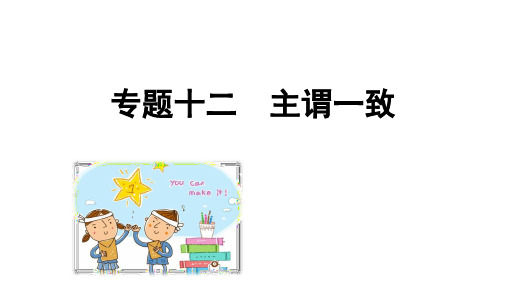
考点 ⑬the+形容词表 示一类人时,谓语 动词用复数形式; 表示抽象概念时, 谓语动词用单数形 式
例句 The poor ar e ver y happy, but the r ich ar e sad. 穷人很快乐, 富人却很 悲伤。 The beautiful lives for ever. 美是永存的。
考点① 主谓一致的三大原则
原则 意义 指主语是单数 形式, 谓语动 语法 词用单数形 一致 式;主语是复 原则 数形式, 谓语 动词用复数形 式 例句 Tom is a good student. 汤姆是个好学生。 They often play football on the playgr ound. 他们经常在操场上 踢足球。
考点
考点 例句 ⑫当由 kind of, This pair of shoes is pair of, glass of 等 Tom ’s. 表示确定数量的名 这双鞋是汤姆的。 词短语修饰主语 Ther e ar e two glasses 时, 谓语动词形式 of water on the table. 与 kind , pair , glass 桌上有两杯水。 等量词保持一致
中考真题面对面
( D )1. (2012 广东 )—Both Li Lei and Han Meimei ________ fond of the TV pr ogram A Bite of China. —I am also deeply moved by its stor ies. A. is B. am C. was D. ar e ( B )2. (2010 广 东 )Rober t with his two kids _______ to the beach for vacation ever y year. A. go B. goes C. went D. ar e going
2019 广东中考英语(人教)语法专项: 第Ⅰ章 专题十一 非谓语动词图片版(共43张PPT)

2014 2015 接不 2016 定式 2017 2018
★in order not to do ★advise not to do ★expect to do ★ask to do ★sb. think it adj. to do
接动 名词
2014 2015 2016 2017 2018
省略 to 的 不定 式
( B )4. (2015 广 东 ) We advise parents _______ their childr en at home alone in or der to keep them away fr om danger. A. not leave B. not to leave C. leave D. to leave
结构 例子 ③用 it 作形式 I find it difficult to lear n 宾语,真正的 Chinese well. 宾语在后面 我发现学好中文很难。
(2)不定式作宾语补足语 My father asked Mar y to buy some flower s back. 我爸爸叫玛丽去买些花回来。 (Mar y 在 句 中 作 宾 语 , to buy 补 充 说 明 Mar y 要做的事) Mr. Li told us not to play computer games in the net bar. 李老师告诉我们不要在网吧玩电脑游戏。 (us 在句中作宾语, not to play 补充说明 us 不要做的事)
( A )3. (2016 广东 ) Leonar do DiCapr io, a famous Amer ican actor, was always expecting _______ an Oscar and finally he made it. A. to win B. will win C. not to win D. not winning
- 1、下载文档前请自行甄别文档内容的完整性,平台不提供额外的编辑、内容补充、找答案等附加服务。
- 2、"仅部分预览"的文档,不可在线预览部分如存在完整性等问题,可反馈申请退款(可完整预览的文档不适用该条件!)。
- 3、如文档侵犯您的权益,请联系客服反馈,我们会尽快为您处理(人工客服工作时间:9:00-18:30)。
介词 具体用法
例子 We are leaving for for 表示动 Hong Kong. at 身去某处,我们正动身去香港。 to 常与 leave, The ship will set off for for star t, set New Yor k tomor r ow. off 等连用 这艘船明天将会启程去 纽约。
中考专题面对面
( D )1. (2012 广 东 )—Why are you standing, Alice? —I can’t see the blackboard clearly. Two tall boys are sitting ______ me. A. behind B. next to C. between D. in front of ( A )2. (2010 广东 )Connie ar r ived ______ the village ______ a snowy night. A. at; on B. at; in C. in; at D. in; on
介 词
具体用法
例子 on May 1st, on Sundays, on Mother’s Day/ New Year’s Day, on the morning of May 1st, on a cold morning
A. on 用在“月份的 日子”或“星期的日 at 子”前 in B. on 用在具体的日 on 子、节日前 C. on 用在某个特定 的早、中、晚前
考点⑤
介词
易混淆介词的对比
例子 There is a r ailway between 表 between the two 示“在两者 cities. 这两座城市 之间” 之间有一条铁路。 between Our teacher is among among 表示 standing among “在三者或 the students. 以上的中 我们的老师站在学 间” 生们中间。
对点专练
用at, in, on, across, through, over填空。
in 1. I will ar r ive at the air por t London next Wednesday. 2. Ther e is a br idge over the r iver. And Bob often walks across the br idge to play with his fr iends. 3. At last, he walked through the for est and saw a village. 4. Ther e was a “ No Smoking” sign on the wall. 5. J ane is waiting for you at the bus stop.
介词
具体用法
例子
since+时间点/ I have been in 过去时的句子 China since 2001. (时间点) (现在完成时) I have been in for +一段时间 since China for 16 year s. for (现在完成时) (时间段) fr om Students go to fr om …to…表 school fr om “从…… Monday to Fr iday. 到……” (不能 学生们从周一到周 用完成时) 五上学。
常见介词的用at six o’clock(在六点 at 表“时 钟),at the moment , 间点”或 at a quar ter past 用于某些 ten(在十点十五分), at night , at last , at the 词组中 end of(在……结束时)
★without 表方式 2015 ◆with 和手段 2016 的介词 2017 ◆without 2018
其他 常见 介词
2014 ★against 2015 2016 2017 2018
2014 2015 2016 ●in need 2017 2018
介词 短语
2014 2015 固定 2016 搭配 2017 2018
考点④ 表示方式、手段或工具的介词
介词 具体用法 with 后跟具 体的工具 in 使用某种 with 材料或语言 in by by 用某种方 式或手段 例子 I dr aw a picture with a pencil. say it in English , say to me in a sweet voice make it by hand(手工 做的),go to wor k by bus(坐公共汽车去上 班)
介 词
具体用法
例子 in the mor ning/ after noon/evening, in the summer vacation , in moder n times (在现代), * in his twenties (在他 20 多岁时)
A. in 用 在 较 长 的一段时间 at ( 世纪、朝代、 年、季节、月份 in 等)前 on B. in 用 在 泛 指 的上下午、 傍晚 前
中考专题面对面
( A )1. (2017 广东)It ’s ver y kind ______ you to lend me your r eusable shopping bags. A. of B. for C. to D. with
( D )2. (2011 广东)It ’s time ______ the weather r eport. Tur n on the r adio, please. A. to B. in C. at D. for
中考专题面对面 ( A )1. (2015 广东)Could you please give me a hand? I can’t complete the task on time ______ your help. A. without B. under C. with D. for ( D )2. (2013 广东 )—Kelly, who’s the gir l ______ glasses in the photo? — It ’s me. I used to wear glasses and have long hair. A. by B. of C. on D. with
( A )3. (2009 广 东 )“ It ’s r eally ver y kind ______ you to help me with the housewor k on Sundays.” said Gr andma Huang. A. of B. with C. for D. fr om
考点③ 表示方向的介词
介词 具体用法 at 有明确的 方向,又带 有较强的目 at 的性 to for to 表示去某 地 例子 Don ’t shout at me! 不要朝我喊叫! Let ’s go to the museum! 我们去博物馆吧! It ’s the way to the zoo. 这是去动物园的路。
介词
具体用法
具体用法 例子 over “在…… Ther e is a br idge 之上”,表垂 over the r iver. 河上有座桥。 over 直之上 under Ther e is a boat under “在… under the br idge. …之下” 桥下有艘船。
介词
具体用法 例子 in 表“在……之 We will finish 内”, in +一段时 befor e 间,用于将来时,the wor k in an hour. after 表示“在何时” 我们将在一小 in 或“一段时间 时内完成工作。 内”
介词
中考专题面对面
( A )1. (2018 广东) —How soon will we get the offer fr om a new high school? —______ about two months. A. In B. For C. Among D. Dur ing ( C )2. (2016 广东)Many young people put mobile games ______ anything else, thinking little of their nor mal lives. A. along with B. behind C. befor e D. in fr ont of
介词
具体用法 befor e 表 “在……之前”
befor e after after 表“在…… 之后”,与过去 in 时连用,常用于 时间点前或后接 “一段时间”
例子 Please wash your hands befor e dinner. 餐前请洗手。 He said that he would be her e after 6:00. 他说他六点钟之 后会来这儿。
since last 3. Har r y has stayed her e night. He has been her e for 16 hour s. 4. I will be out at eight o’clock tomor r ow. And I will come back in a month. 5. They get up at 6:30 ever y mor ning. But yester day they got up at a quar ter past seven.
◆lear n fr om ◆look after ★It ’s adj. of sb. to do sth. ◆in his later life
考点分析: 从近 5 年的考查情况来看,介词是每 年单项填空和短文填空的必考点, 2019 年 备考时要注意掌握好介词的用法、辨析及 固定搭配。
考点① 表示时间的介词
